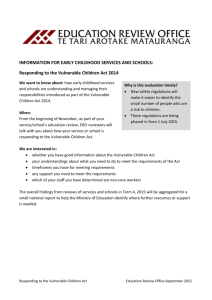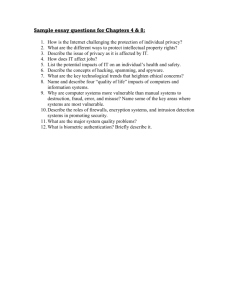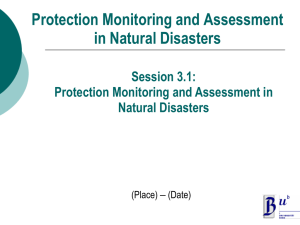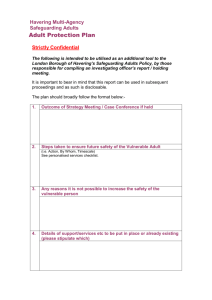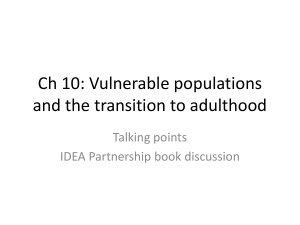Policy on Vulnerable Groups THE CITY OF CAPE TOWN DRAFT POLICY March 2013
advertisement
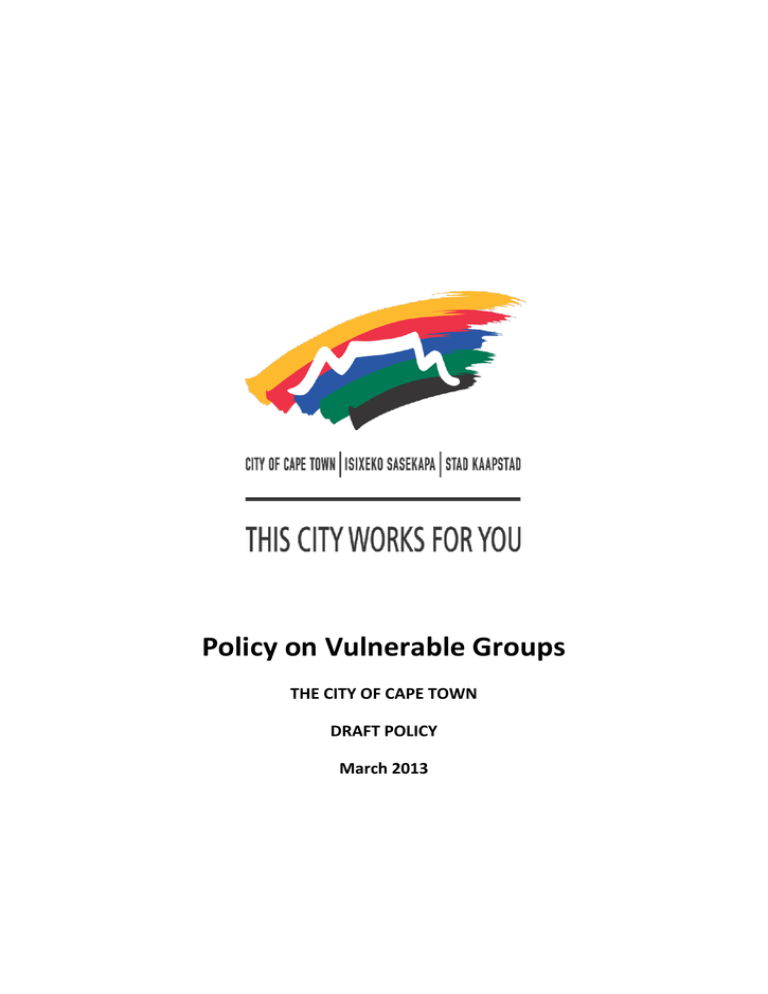
Policy on Vulnerable Groups THE CITY OF CAPE TOWN DRAFT POLICY March 2013 Contents Policy Title............................................................................................................................................................... 4 Reference codes ..................................................................................................................................................... 4 Document control ................................................................................................................................................... 4 Abbreviations.......................................................................................................................................................... 4 Definitions .............................................................................................................................................................. 4 1. Problem Statement......................................................................................................................................... 6 1.1 Problem Statement on Persons with Disabilities .................................................................................. 6 1.2 Problem Statement on Vulnerable Women and Gender ...................................................................... 7 1.3 Problem Statement on Older Persons .................................................................................................. 7 1.4 Problem Statement on Vulnerable Children ......................................................................................... 8 2. Desired Outcomes .......................................................................................................................................... 9 3. Strategic Intent ............................................................................................................................................... 9 3.1 Integrated Development Plan ............................................................................................................... 9 3.2 City Development Strategy and OneCape2040 Agenda...................................................................... 10 3.3 Draft Social Development Strategy ..................................................................................................... 10 4. Policy Parameters ......................................................................................................................................... 10 5. Role players and stakeholders ...................................................................................................................... 11 5.1. Mayoral Committee member ............................................................................................................. 11 5.2. City of Cape Town Directorate for Social Development and Early Childhood Development .............. 11 5.3 Non- Governmental Organisations and Community-based Organisations focussing on the rights and advancement of vulnerable groups. ................................................................................................................. 11 6. 7. Regulatory Context ....................................................................................................................................... 11 6.1 The Constitution of the Republic of South Africa 1996 Act No 108 of 1996 ....................................... 11 6.2 Local Government: Municipal Systems Act, No 32 of 2000 ................................................................ 11 6.4 Other relevant legislation and policy .................................................................................................. 12 Policy Directives ............................................................................................................................................ 12 7.1. Promote and support the delivery of awareness and training programmes in consultation with NGOs registered with Provincial DSD, CBOs and other spheres of government throughout the City of Cape Town 12 7.1.4 Vulnerable Children & Orphans ...................................................................................................... 12 7.1.5 Persons with disabilities ................................................................................................................. 13 7.1.6 Older Persons.................................................................................................................................. 13 7.1.7 Vulnerable Women and Gender ..................................................................................................... 13 7.2 Promote and support the delivery of early intervention training programmes in consultation with NGOs registered with Provincial DSD, CBOs and other spheres of government throughout the City of Cape Town 13 7.2.1 Vulnerable Children & Orphans ...................................................................................................... 13 7.2.2 Persons with disabilities ................................................................................................................. 13 7.2.3 Older Persons.................................................................................................................................. 14 7.3. Promotion and support of a cohesive and effective network of structures, organisations and groups to promote the rights and advancement of vulnerable groups. ...................................................................... 14 7.4. Ensure that the City conducts and utilises research on vulnerable groups to inform the design and delivery of services and strategies. ................................................................................................................... 14 7.5 Collaborate with other spheres of government and more specifically with the Western Cape Provincial Government Department of Social Development to avoid duplication of funding and to contribute towards unity of effort in the delivering of social development services. ....................................................... 14 8. Monitoring, Evaluation and Review.............................................................................................................. 14 Policy Title Policy on Vulnerable Groups Reference codes Document control Version: Draft 1 Status: Review Review date: March 2013 Contact details: Alfonso Sauls E-mail: Alfonso.Sauls@capetown.gov.za Tel: 0214440301 Abbreviations ED CDS IDP SDBIP SDECD SDS WC DSD NGO CBO Definitions City Council Child Child-headed Household Directorates Disability Double Orphans Empowerment Gender Executive Director City Development Strategy Integrated Development Plan Service Delivery Budget Implementation Plan Social Development and Early Childhood Development Directorate Social Development Strategy Western Cape Department of Social Development Non-Governmental Organisations focussing on the promotion of the rights and advancement on vulnerable groups Community-based Organisations focussing on the promotion of the rights and advancement on vulnerable groups City of Cape Town Council of the City of Cape Town Individuals under the age of 18 years Households headed by a child and that contains only children Directorates of the City of Cape Town In 2005, the South African Cabinet adopted the following definition of disability for our country: “Disability is the loss or elimination of opportunities to take part in the life of the community equitably with others that is encountered by persons having physical, sensory, psychological, developmental, learning, neurological or other impairments, which may be permanent, temporary or episodic in nature, thereby causing activity limitations and participation restriction with mainstream society". These barriers may be due to economic, physical, social, attitudinal and/or cultural factors. Children whose biological parents have passed away Refers to the process of "conscientisation" which builds critical analytical skills for an individual to gain self-confidence in order to take control of her or his life. In this policy framework document, refers to the social roles allocated respectively to women and to men in particular societies and at particular times. Such roles, and the differences between them, are conditioned by a variety of Gender Awareness Gender Equality Gender Mainstreaming Gender Sensitive Mainstreaming Older persons Orphans Programme Project The Constitution Vulnerable Groups Vulnerable Person political, economic, ideological and cultural factors and are characterised in most societies by unequal power relations. Gender is distinguished from sex which is biologically determined. Refers to a state of knowledge of the differences in social roles and relations of women and men and how this results in differences in power relations, status, privileges and needs. Refers to a situation where women and men have equal conditions for realizing their full human rights and potential; are able to contribute equally to national political, economic, social and cultural development; and benefit equally from the results. Gender equality entails that the underlying causes of discrimination are systematically identified and removed in order to give women and men equal opportunities. The concept of gender equality, as used in this policy framework, takes into account women’s existing subordinate positions within social relations and aims at the restructuring of society so as to eradicate male domination. Therefore, equality is understood to include both formal equality and substantive equality; not merely simple equality to men. Refers to a process that is goal oriented. It recognises that most institutions consciously and unconsciously serve the interests of men and encourages institutions to adopt a gender perspective in transforming themselves. It promotes the full participation of women in decision-making so that women’s needs move from the margins to the centre of development planning and resource allocation. Refers to the state of knowledge of the socially constructed differences between women and men, including differences in their needs, as well as to the use of such knowledge to identify and understand the problems arising from such differences and to act purposefully to address them. Refers to a process that is goal oriented. It recognises that most institutions consciously and unconsciously serve the interests of abled persons and encourages institutions to adopt a disability perspective in transforming themselves. It promotes the full participation of persons with disabilities in decision-making so that the needs of the persons with disabilities move from the margins to the centre of development planning and resource allocation. Individuals aged of 60 years and older Children whose mother, father or both biological parents have died A systematic action-oriented design of a plan of action towards achieving a particular goal. The design of an implementation strategy of a plan of action geared towards achieving a particular goal. The Constitution of South Africa Act 108 of 1996 Vulnerable Groups will include, persons with disabilities, older persons, vulnerable women and orphans A person whose survival, care, protection or development may be compromised, due to a particular condition, situation or circumstance and which prevents the fulfilment of his or her rights. 1. Problem Statement 1.1 Problem Statement on Persons with Disabilities 1.1.1 Despite considerable progress made with regards to the legal status of disabled persons being entrenched in the Bill of Rights of the Constitution of South Africa Act, No 108 of 1996 (The Constitution), disabled persons in South Africa do not enjoy equal rights in practice. 1.1.2 “Despite the remarkable progress government has made in developing enabling legislation, transforming the state machinery and putting structures in place to be representative and responsive to the developmental needs of the People with Disabilities, the majority of People with Disabilities are still exposed to restrictive environments and barriers that continue to marginalise and exclude them from mainstream society and its social and economic activities” (Department of Social Development, 2009). 1.1.3 Persons with disabilities face serious challenges to participate meaningfully in community activities with regard to access to public institutions and facilities, employment opportunities, appropriate skills training, etc. 1.1.4 In a 2006 submission to the Constitutional Review Committee, the South African Human Rights Commission flagged the lack of tolerance and acceptance towards South Africans living with disabilities. They further note that there is: “Lack of an adequate human rights culture of tolerance and acceptance; that intolerance is aggravated by a general lack of awareness and knowledge about the different types of disability, and the causes and ways of ensuring acceptance of persons with disabilities within communities; that there is still a presence of negative stigmas within communities associated with disability; that there is an invisibility of persons with disabilities in communities resulting in their specific and special needs not being adequately addressed; that this is further perpetuated by inadequate representation of persons in the work place; and that in terms of education there is a lack of integration of learners with disabilities into schools and also a lack of schools in many provinces for learners with special needs” (South African Human Rights Commission, 2006). 1.1.5 Local government is the sphere of government that is closest to communities. The services that are provided by municipalities to communities can make a significant change in not only the condition, but also the position of persons with disabilities, as well as play a dynamic role in redressing past imbalances in communities. 1.1.6 It is Local Government’s moral and legal responsibility to engage in an approach in all its policies, programmes and projects in order to ensure fairness in the treatment of persons with disabilities. 1.1.7 Specific measures must be developed to identify and remove the underlying causes of discrimination in policies, laws, procedures, beliefs, practices and attitudes. This can only be achieved from a multi-dimensional approach that focuses on all aspects pertaining to the development of disabled persons both internal and external to the City of Cape Town. 1.2 Problem Statement on Vulnerable Women and Gender 1.2.1 Despite considerable progress made regarding the legal status of women, and despite gender equality being entrenched in the Bill of Rights of The Constitution, South African women and men do not enjoy equal rights in practice. Women are still faced with challenges of poverty, unemployment, physical abuse and violence perpetrated by society. 1.2.2 Local government is the sphere of government that is closest to communities. The services that are provided by municipalities to communities can make a significant change in not only the condition, but also position of women and men, as well as play a dynamic role in redressing past racial and gender imbalances in communities. It is local government’s moral and service delivery responsibility to adopt a gender equality approach in all its policies, programmes and projects in order to ensure fairness in the treatment of women and men. 1.2.3 Specific measures must be developed to identify and remove the underlying causes of discrimination in policies, laws, procedures, beliefs, practices and attitudes that maintain gender inequality. This can only be achieved from a multi-dimensional approach that focuses on all aspects pertaining to development gender sensitivity both internal and external to the City of Cape Town. 1.2.4 “Poverty patterns are inherently influenced by gender. Women, particularly female-headed households, are generally much poorer than men. In the past women were unable to access the same economic resources and opportunities than men. The resulting inequality was, and still is, intensified by additional race-based discrimination and inequality. Female-headed households tend to have fewer adults of working age, while also experiencing higher unemployment rates. Women are overrepresented in low-skilled, low-paying jobs and the wage gap between male and female earnings persists, particularly in low and semi-skilled occupations. Hence, a continual division in labour between men and women exists; women's roles are underrated in economic terms and their work is demoted to being domestic and unpaid” (Stats SA: Census 2011). 1.2.5 The IDP makes specific reference to a Gender Programme in the “Caring City Strategic Focus Area” (SFA) noting that “The City seeks to create an enabling environment for the provision of services that are gender-sensitive”. 1.3 Problem Statement on Older Persons 1.3.1 The majority of Older Persons in the Western Cape have been deprived of adequate education, employment and socio-economic opportunities. Without the means to break free from the bondage of poverty, the majority of older people were unable to provide for their old age through secure retirement benefits or by ensuring that their children would flourish. Older Persons not only need assistance, they deserve it. Older persons face many challenges and the South African legislation addresses The Constitutional mandate to protect the human rights of Older Persons by removing all forms of racial discrimination and by addressing inequality in government-funded services. Ageing is recognised as an inevitable stage of life, which requires special needs. The developmental paradigm aims to enable Older Persons to live active, healthy and independent lives for as long as possible. 1.3.2 Older Persons are extremely vulnerable to disease, and their health is often affected by poor nutrition, quality access to medical care and poverty. 1.3.3 The absolute number and proportion of older people in South Africa have increased considerably over the past decades. Between 2002 and 2011, the total number of persons over the age of 60 years increased by 35% to 3.9 million. During this period the percentage of Older Persons increased from 6.3% to 7.7%, making South Africa the country with arguably the largest percentage of Older Persons on the continent. This figure is expected to increase further over the next decades. The older person population in Western Cape comprised 47% Coloured people, 43% White people, 9.5% Black people and 0.6% Indian/Asian people. (Stats SA: Census 2011) 1.3.4 The role of Older Persons in households is continuously being affected by issues such as labour migration, poverty, as well as HIV/AIDS. Although it has traditionally been assumed that extended families and the community will take care of Older Persons, many families are simply too disjointed to look after the well-being of Older Persons (Fernandez-Castilla, in Lombard and Kruger, 2009). In fact, older persons are increasingly required to play an active care and support role in their respective households. The percentage of households headed by older persons in the Western Cape has increased from 17.6% in 2002 to 23% in 2011. (Stats SA: Census 2011) 1.4 Problem Statement on Vulnerable Children 1.4.1 A vast majority of South Africa's children continue to live in poverty and are faced with considerable inequalities that continue to inhibit their access to better life opportunities, enhanced educational levels and improved health outcomes. 1.4.2 Although South Africa has almost achieved universal access to basic education and gender parity, the number of children who have never been in school, or who have dropped out remains a problem (Presidency, 2009). 1.4.3 According to Stats SA, 9.8% of South Africa’s children lives in the Western Cape, with 19.1% of all children in South Africa were orphaned in 2011. Less than 10% of children in the Western Cape were classified as orphans. The deterioration of South African family structures, inter alia as a result of labour migration and poverty, caused many children to grow up and live without their biological parents. Although approximately one fifth of all children in South Africa were orphaned, and about 4.7% were double orphans, the low percentage of children that resided in child headed households suggests that orphaned children were probably absorbed into existing households. Child-headed households, otherwise known as child-only households, are defined as households that comprise only individuals aged 18 years or younger. The percentage of child-headed households stayed between 0.5% and 0.7% of all households between 2002 and 2011. Child-only households comprised approximately 84 000 households in 2011. The percentage of child-headed households in the Western Cape, were 0.2% in 2011. Child-headed households consistently listed remittances as their main source of income between 2002 and 2011. Although children in child-headed households are known to be more vulnerable to poor living conditions than children in mixed generation households, children in mixed generation households who suffer similar burdens of poverty and inadequate service delivery might be compromised by a disproportionate focus on child-headed households. 31.8% of children in the Western Cape are living in households that experienced inadequate or severely inadequate access to food (Stats SA: Census 2011). 1.4.4 Too many of our children within the City of Cape Town are subjected to horrendous acts of violence and abuse, often with fatal consequences and often by people known to them. The drivers and contributing factors to this are many, varied and sometimes mutually reinforcing, but the common result is that they pose a serious threat to children’s health, development and survival. The City of Cape Town has duty to play a leading role in creating an environment where there is no place for or tolerance of the abuse and exploitation of children. 2. Desired Outcomes The aims of this Policy are to: 2.1. articulate specific interventions to meet the needs of vulnerable groups 2.2. ensure the delivery of awareness, development and training programmes in consultation with NGOs registered with Provincial DSD, CBOs and other spheres of government throughout the City of Cape Town; 2.3 promote and support a cohesive and effective network of structures, organisations and groups focussing on vulnerable groups; 2.4 ensure that the City conducts and utilises research on issues of vulnerable groups to inform the design and delivery of services and strategies; 2.5 guide the collaboration with other spheres of government and more specifically with the Western Cape Provincial Government Department of Social Development to avoid duplication of funding and to contribute towards unity of effort in the delivering of social development services. 3. Strategic Intent 3.1 Integrated Development Plan The IDP of the City is built on five Strategic Focus Areas (SFAs) namely: the Opportunity City, the Safe City, the Caring City, the Inclusive City, and the Well-Run City. These key focus areas inform the Policy on Vulnerable Groups of the City by creating the: 3.1.1 Opportunity City, through the creation of an enabling environment that would ensure the empowerment of vulnerable groups towards equality; 3.1.2 Caring City, through the creation of an enabling environment for the provision of services to meet the needs vulnerable groups; 3.1.3 Opportunity City, through the creation of an enabling environment that would ensure the empowerment of vulnerable groups; 3.1.4 Well-run City, through the provision of guidelines to policymakers, programme managers and service delivery units of the City about understanding the implications of their work on vulnerable groups and the mainstreaming into all aspects of their operations. 3.2 City Development Strategy and OneCape2040 Agenda The City Development Strategy (CDS) is the 30 year strategy for the City. It is informed by the six ‘transitions’ identified in the OneCape2040 Agenda which articulates the vision for the Western Cape region. This policy is aligned with the “Settlement Transition”. The goal of this transition is to build ‘healthy, accessible, liveable multi-opportunity communities’. 3.3 Draft Social Development Strategy 3.3.1 The Draft Social Development Strategy (SDS) articulates the role of the City in promoting and maximising social development. Social development is understood broadly as the overall improvement and enhancement in the quality of life of all people, especially people who are poor, vulnerable or marginalised. 3.3.2 The third high-level objective of the SDS is to “support the most vulnerable through enhancing access to infrastructure and social services”. One of the key levers identified to achieve this is a “Champion the inclusion of vulnerable people across the City”. 4. Policy Parameters 4.1 The policy affects all persons living in the City of Cape Town. 4.2 This Policy on Vulnerable Groups is intended to be complementary to current strategies and policies of the City of Cape Town 4.3 This policy guides the work of NGO’s or CBO’s conducting projects on behalf of, or in partnership with the City of Cape Town. 5. Role players and stakeholders 5.1. Mayoral Committee member 5.1.1 Lead the Directorate mandate of ensuring transformation on vulnerable groups’s issues and the empowerment of vulnerable groups. 5.1.2 Account to the Council through the Mayor on the performance of the Directorate in implementing the programmes focussing on vulnerable groups. 5.2. City of Cape Town Directorate for Social Development and Early Childhood Development 5.2.1. Senior management are committed to equality by creating an enabling environment to promote the rights and advancement of vulnerable groups. 5.2.2 Each unit to develop and report on indicators and targets to promote rights and advancement on vulnerable groups. 5.2.3 Each unit to commemorate awareness days of vulnerable groups. 5.3 Non- Governmental Organisations and Community-based Organisations focussing on the rights and advancement of vulnerable groups. 5.3.1 Promote buy-in by all major stakeholders in the City including grassroots organisations that work on programmes related to the rights and advancement of vulnerable groups. 5.3.2 Support programmes to enhance the impact of the Policy on Vulnerable Groups. 6. Regulatory Context This Policy draws its mandate from the following national and local instruments which advocate the enjoyment of rights of vulnerable groups in an equitable way. 6.1 The Constitution of the Republic of South Africa 1996 Act No 108 of 1996 Chapter 2 of The Bill of Rights specifically prohibits direct and indirect discrimination, by the state or an individual, against anyone on the basis of race, gender, sex, etc. and it constitutes a Constitutional violation of a person’s right. 6.2 Local Government: Municipal Systems Act, No 32 of 2000 Mechanisms, processes and procedures for community participation outlined in this require that municipalities take into account the special needs of disadvantaged groups. It also indicates that community members have the right to the use and enjoyment of public facilities and the right to have access to basic services that municipalities provide. 6.4 Other relevant legislation and policy 6.4.1 Promotion of Equality and Unfair Discrimination Act, No 4 of 2000 6.4.2 Domestic Violence Act, No 116 of 1998 6.4.3 Child Care Act, No 74 of 1983 6.4.4 Child Care Amendment Act, No 86 of 1991 & 13 of 1999 6.4.5 The Older Persons Act, No 13 of 2006 6.4.6 Women Empowerment and Gender Equity Bill (August 2012) 6.4.7 Integrated National Disability Strategy (1997) 6.4.8 Disability Framework for Local Government 2009 – 2014 6.4.9 City of Cape Town Policy on Employment Equity 6.4.10 City of Cape Town Anti-Discrimination Policy 7. Policy Directives 7.1. Promote and support the delivery of awareness and training programmes in consultation with NGOs registered with Provincial DSD, CBOs and other spheres of government throughout the City of Cape Town 7.1.1. Promote and support the implementation of awareness campaigns and training programs that aim to change perceptions, attitudes and behaviour, so that the status of vulnerable groups can be improved. 7.1.2. Develop or use existing platforms that will increase the dialogue and profile of issues affecting vulnerable groups so that practical solutions and best practices will emerge to guide the planning and implementation of plans and programmes. 7.1.3. Promote and support programmes (awareness, training and preventative) for a safer City. 7.1.4 Vulnerable Children & Orphans 7.1.4.1 Children, families, caregivers and communities are aware of their rights and responsibilities and the services available to strengthen and support them 7.1.4.2 Celebration of national and international days (Child Protection month, Youth month, 16 days of activism against women and child abuse and festive season programmes 7.1.4.3 Prevention against violence services 7.1.4.5 Fatherhood Education and Training Programmes 7.1.5 Persons with disabilities 7.1.5.1 Lobbying amongst communities for mainstreaming of disability 7.1.5.2 Celebrating international and National Days 7.1.6 Older Persons 7.1.6.1 Awareness programmes on the rights of older persons 7.1.6.2 Awareness workshops on the Older Persons Act, No 13 of 2006 7.1.6.3 Celebration of national and international days 7.1.6.4 Prevention against Older Persons Abuse and Dementia 7.1.6.5 The provision of integrated and targeted awareness programmes that link older persons to available support services 7.1.7 Vulnerable Women and Gender 7.1.7.1 Awareness programmes on the rights of women and gender issues 7.1.7.2 Awareness workshops on the Empowerment and Gender Equity Bill (August 2012); 7.1.7.3 Celebration of national and international days 7.1.7.4 Prevention against Gender-based violence 7.1.7.5 The provision of integrated and targeted awareness programmes that link abused women to available support services 7.1.7.6 Human rights services 7.2 Promote and support the delivery of early intervention training programmes in consultation with NGOs registered with Provincial DSD, CBOs and other spheres of government throughout the City of Cape Town 7.2.1 Vulnerable Children & Orphans 7.2.1.1 Family Preservation Programmes 7.2.1.2 Marriage and Family Enrichment Programmes 7.2.2 Persons with disabilities 7.2.2.1 Life skills programmes 7.2.2.2 Economic development programmes at organisations registered with DSD 7.2.2.3 Community outreach projects as respite care and therapeutic services 7.2.2.4 Home based care projects 7.2.3 Older Persons 7.2.3.1 Community outreach projects such as respite care and therapeutic services 7.2.3.2 Mentoring and Capacity Building of clubs 7.2.3.3 Home based care projects 7.3. Promotion and support of a cohesive and effective network of structures, organisations and groups to promote the rights and advancement of vulnerable groups. 7.3.1. Support for mechanisms that will facilitate the collaboration and inter-connectedness of intergovernmental and government-and-civil society structures to ensure that maximum benefit and impact is derived from the collective efforts. 7.3.2. Support internal mechanisms to ensure that Directorates within the City do collaborate and form partnerships with regard to programmatic and policy issues. 7.4. Ensure that the City conducts and utilises research on vulnerable groups to inform the design and delivery of services and strategies. 7.4.1. Support partnerships (like CHEC, etc.) with relevant learning and research institutions to undertake research that will promote the aims and objectives of the vulnerable groups’s agenda of the City. 7.5 Collaborate with other spheres of government and more specifically with the Western Cape Provincial Government Department of Social Development to avoid duplication of funding and to contribute towards unity of effort in the delivering of social development services. 7.5.1 The Implementation Protocol Agreement between the City of Cape Town and the Provincial Department of Social Development must guide this collaboration. 8. Monitoring, Evaluation and Review 8.1 The objective of monitoring is to evaluate the impact and effectiveness of programmes to promote the rights and advancement of vulnerable groups as well as the success of programmes focused at the various stakeholders. 8.2 Evaluation is seen as a continual process throughout the life of this Policy. It is anticipated that all projects and initiatives undertaken by Council emerging from or influenced by this Policy will be evaluated in relation to their outcomes. 8.3 The SDECD shall develop a SDBIP with clear measurable objectives, indicators and targets to enhance the implementation of this Policy. 8.4 The Monitoring and evaluation of advancement and empowerment projects will be aligned to the outcomes-based approach. 8.5 The Vulnerable Groups Programme will oversee the implementation of vulnerable groups programmes across the Directorate. 8.6 All units within the Directorate are to account on a quarterly basis on implementation of the Policy on Vulnerable Groups in line with their SDBIP. 8.7 The ED of the Directorate are to submit their quarterly and annual reports as per delivery agreements, on the mainstreaming of vulnerable groups and empowerment programmes to the Mayoral Committee member and Portfolio Committee (PC) for SDECD. 8.8 With the assistance of the Mayoral Committee Member and PC Councillors, the administrators will conduct an annual review on the outcomes and achievements and will report on the outcomes of this Policy. 8.9 The Mayoral Committee member and PC of SDECD will monitor the implementation of the Policy. This will inform the refinement of current actions and the development of further short to long-term actions for the advancement and empowerment of vulnerable groups in the City of Cape Town.
